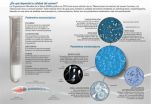(Press-News.org) Scientists from the University of Sheffield have unlocked one of the secrets to DNA repair –helping doctors identify DNA base damage and a patient's susceptibility to certain types of cancer.
Groundbreaking research led by Dr David Williams from the University of Sheffield's Department of Chemistry and an international collaboration of expert researchers has discovered how some proteins recognise damaged bases within DNA which, if untreated, could lead to cancer.
Dr Williams said: "Proteins carry out all the day-to-day processes needed for survival. If the DNA bases become damaged the associated protein may not function or in some cases, too much of a certain protein can be produced – which might lead to cancer.
"Everyday humans are exposed to chemicals known as alkylating agents which may be derived from environmental sources or from dietary sources such as a high intake of red or processed meat or exposure to tobacco smoke. Alkylating agents can chemically modify the bases in DNA which can, in turn, lead to non-functional proteins being produced or indeed cancer.
"Fortunately humans have a large number of different DNA repair proteins whose task it is to find and repair damaged bases in DNA. However DNA base damage, although highly problematic, is rare and often only one or two bases per million or even fewer. The task of locating a damaged base is similar to finding a needle in a haystack."
DNA contains all the information needed for life within the sequence of its four bases; adenine, cytosine, guanine and thymine. Specific sequences of bases in DNA known as genes instruct what proteins are made and furthermore genes may be switched on or off to control how much of each protein is made.
The pioneering research, published in the journal: Proceeding of the National Academy of Sciences of the United States of America (PNAS), was conducted by scientists from the University of Sheffield, University of Manchester and the Scripps Research Institute in California and focuses on damage to the guanine base to form O6-alkylguanine, a type of damage that is particularly prevalent in colon or bowel cancer.
"In humans this is repaired by alkyltransferase proteins that simply reverse the damage of these modified bases, converting them back to guanine," said Dr Williams.
"We have uncovered an exquisite mechanism whereby a positively charged side chain of the amino acid arginine found in the Alt1 protein is used to check the electronic charge distribution across the DNA base, which is altered by alkylation damage.
"This method of recognition, we believe, may also be used by many other DNA repair proteins to recognise damaged bases within DNA. A further exciting discovery we have made is to show that the alkyltransferase-like protein Alt1 can detect all known types of O-alkylguanine modification.
"Consequently, Alt1 has potential for use in identifying and quantifying levels of certain O6- alkylguanines in human tissue biopsies. This would be informative to clinicians about individual susceptibility to certain cancers, particularly colorectal."
###
**Images available**
Notes for Editors
The University of Sheffield's Department of Chemistry
https://www.sheffield.ac.uk/chemistry
The University of Sheffield
With nearly 25,000 students from 125 countries, the University of Sheffield is one of the UK's leading and largest universities. A member of the Russell Group, it has a reputation for world-class teaching and research excellence across a wide range of disciplines.
The University of Sheffield has been named University of the Year in the Times Higher Education Awards for its exceptional performance in research, teaching, access and business performance. In addition, the University has won four Queen's Anniversary Prizes (1998, 2000, 2002, 2007). These prestigious awards recognise outstanding contributions by universities and colleges to the United Kingdom's intellectual, economic, cultural and social life. Sheffield also boasts five Nobel Prize winners among former staff and students and many of its alumni have gone on to hold positions of great responsibility and influence around the world.
The University's research partners and clients include Boeing, Rolls-Royce, Unilever, Boots, AstraZeneca, GSK, ICI, Slazenger, and many more household names, as well as UK and overseas government agencies and charitable foundations.
The University has well-established partnerships with a number of universities and major corporations, both in the UK and abroad. Its partnership with Leeds and York Universities in the White Rose Consortium has a combined research power greater than that of either Oxford or Cambridge.
For further information, please visit www.sheffield.ac.uk
For further information please contact: Amy Pullan, Media Relations Officer, on 0114 222 9859 or email a.l.pullan@sheffield.ac.uk
To view this news release and images online, visit: http://www.shef.ac.uk/news/nr/unlocking-dna-repair-1.221292
To read other news releases about the University of Sheffield, visit: http://www.shef.ac.uk/news
Unlocking the secrets of DNA repair
2012-10-31
ELSE PRESS RELEASES FROM THIS DATE:
How and why herpes viruses reactivate to cause disease
2012-10-31
The mere mention of the word "herpes" usually conjures negative images and stereotypes, but most people have been infected with some form of the virus. For most, a sore appears, heals and is forgotten, although the virus remains latent just waiting for the right circumstances to come back. Now, the mystery behind what triggers the virus to become active again is closer to being solved thanks to new research published in the Journal of Leukocyte Biology's November 2012 issue. In the report, scientists show how the immune system may lose its control over the virus when facing ...
Men who do exercise produce better quality semen
2012-10-31
A new study conducted by researchers at the University of Cordoba links moderate physical activity in males with better hormone levels and sperm characteristics that favour reproduction compared to sedentary men.
Semen quality at large has dropped in the last 50 years. Amongst other factors, this is due to exposure to external agents and alcohol and tobacco consumption. This decline in sperm properties has caused an increase in reproductive problems.
Therefore, experts have studied the possible relationship between sperm quality and lifestyle habits in males. Published ...
Microscopic packets of stem cell factors could be key to preventing lung disease in babies
2012-10-31
Boston, Mass.—Researchers at Boston Children's Hospital have found that microscopic particles containing proteins and nucleic acids called exosomes could potentially protect the fragile lungs of premature babies from serious lung diseases and chronic lung injury caused by inflammation.
The findings explain earlier research suggesting that while transplanting a kind of stem cell called mesenchymal stem cells (MSCs) could help reduce lung injury and prevent inflammation in a mouse model, the fluid in which the cells were grown was more effective than the cells themselves.
The ...
Biofuel breakthrough: Quick cook method turns algae into oil
2012-10-31
ANN ARBOR—It looks like Mother Nature was wasting her time with a multimillion-year process to produce crude oil. Michigan Engineering researchers can "pressure-cook" algae for as little as a minute and transform an unprecedented 65 percent of the green slime into biocrude.
"We're trying to mimic the process in nature that forms crude oil with marine organisms," said Phil Savage, an Arthur F. Thurnau professor and a professor of chemical engineering at the University of Michigan.
The findings will be presented Nov. 1 at the 2012 American Institute of Chemical Engineers ...
Scientists unravel resistance to breast cancer treatment
2012-10-31
Scientists have identified a molecular 'flag' in women with breast cancer who do not respond or have become resistant to the hormone drug tamoxifen.
Tamoxifen – used alongside traditional chemotherapy and radiotherapy – blocks the female hormone oestrogen that, in certain breast cancers, is required by the tumour to grow; it has been shown to improve cancer survival rates by up to one third.
However, about one third of patients with the appropriate type of breast cancer – known as oestrogen receptor positive breast cancer – do not respond to tamoxifen or develop resistance ...
Foggy perception slows us down
2012-10-31
This press release is available in German.
Fog is an atmospheric phenomenon that afflicts millions of drivers every day, impairing visibility and increasing the risk of an accident. The ways people respond to conditions of reduced visibility is a central topic in vision research. It has been shown that people tend to underestimate speeds when visibility is reduced equally at all distances, as for example, when driving with a uniformly fogged windshield. But what happens when the visibility decreases as you look further into the distance, as happens when driving in ...
Social factors trump genetic forces in forging friendships, CU-led study finds
2012-10-31
"Nature teaches beasts to know their friends," wrote Shakespeare. In humans, nature may be less than half of the story, a team led by University of Colorado Boulder researchers has found.
In the first study of its kind, the team found that genetic similarities may help to explain why human birds of a feather flock together, but the full story of why people become friends "is contingent upon the social environment in which individuals interact with one another," the researchers write.
People are more likely to befriend genetically similar people when their environment ...
Team uses antisense technology that exploits gene splicing mechanism to kill cancer cells
2012-10-31
Cold Spring Harbor, N.Y. – Cancer cells grow fast. That's an essential characteristic of what makes them cancer cells. They've crashed through all the cell-cycle checkpoints and are continuously growing and dividing, far outstripping our normal cells. To do this they need to speed up their metabolism.
CSHL Professor Adrian Krainer and his team have found a way to target the cancer cell metabolic process and in the process specifically kill cancer cells.
Nearly 90 years ago the German chemist and Nobel laureate Otto Warburg proposed that cancer's prime cause was a change ...
New tick disease in Switzerland
2012-10-31
Until now, we knew that ticks primarily transmit two pathogens to humans in Switzerland: the bacterium Borrelia burgdorferi – which causes borreliosis – and the early-summer-meningoencephalitis virus, which can cause cerebral inflammation. Now, microbiologists from the University of Zurich confirm the existence of another tick disease in Switzerland – neoehrlichiosis.
The pathogenic bacteria Candidatus Neoehrlichia mikurensis was first discovered in ticks and rodents in Europe and Asia in 1999. In 2010, Head of Molecular Diagnostics at the Institute of Medical Microbiology ...
Seniors particularly vulnerable in Sandy's aftermath
2012-10-31
Older adults left in the wake of Hurricane Sandy will likely suffer disproportionately in the days ahead, based on data from other recent natural disasters.
For example, three quarters of those who perished in Hurricane Katrina were over the age of 60, according to the spring 2006 edition of Public Policy & Aging Report from The Gerontological Society of America (GSA). Similarly, a recent issue of the Journals of Gerontology Series A: Biological Sciences and Medical Sciences reported that the May 2008 earthquake in Wenchuan, China, was associated with a twofold increase ...

